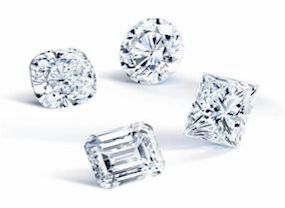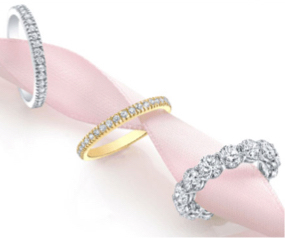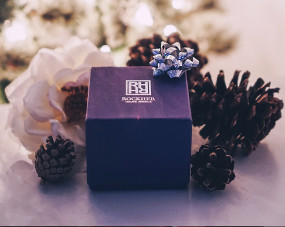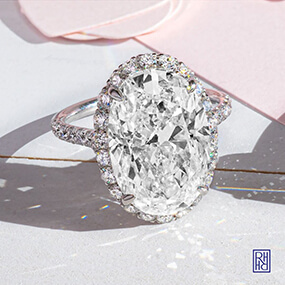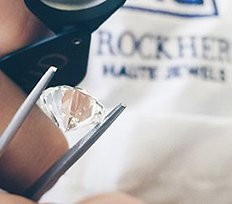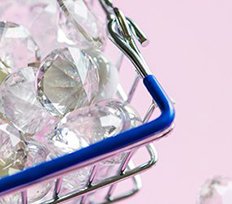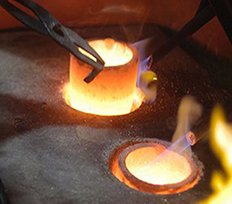If you have an unlimited budget, buying a diamond is easy: just get a 15-carat D Flawless in your favorite shape. Done. For the rest of us, it’s a balancing act: where do you compromise to get the best possible diamond for your budget?
When you consider all the value factors, comparing all the possibilities gets complicated.
Should you choose the F SI1 or the H VVS2? What about fluorescence? Is good OK for the cut or do you need excellent? How do you balance size and quality? That’s why we built ROSI: artificial intelligence, armed with diamond expertise, is the best way to crunch the numbers for thousands and thousands of diamonds to find the best possible value.
What does that mean for diamond color? It means an H-color diamond. Why should you choose an H-color grade? Because when the right H-color diamond is set in your engagement ring, it will be brilliant, beautiful and colorless. A professional might see a hint of color but honestly you won’t. And the money you save by buying H-color will mean you can afford a very well cut larger diamond: two things that everyone who looks at the ring will definitely see right away.
If you’ve researched diamonds online, you’ve probably read that G-color is your best option. So has everyone else who is researching diamonds. That means that there is a lot of demand for G-color diamonds and they cost more than they should. H-color diamonds represent a much better value as a result. G-color diamonds are not a bad choice but it’s not worth paying a lot more for G than H. That’s because you won’t really be able to see the difference between G and H in your ring, especially if the H is really well cut.
Here’s why. Gemological laboratories grade diamonds upside down so that the body color of the gem is visible without being diluted by its brilliance, scintillation, and dispersion (the three characteristics that give a diamond its sparkle and shine.)
Drawing the lines between diamond color grades is very difficult. To make it a bit easier, diamond color is graded by comparing a sample stone to a set of diamond master stones. Graders compare a diamond to each of the master stones, finding its place in the line. Every time, the same light, the same angle, and the same tools are used to keep grades constant. Two graders look at every stone and they have to agree.
What does H color really mean? It means that this diamond, when placed upside down next to a diamond master set, can be seen by a trained professional to have slightly more color than G color but slightly less than an I color diamond. The slight differences in color can only be seen consistently in comparison, face down, in a controlled environment.
Will you be able to tell that your diamond is an H-color when you wear it in an engagement ring? Diamond professionals will be able to see that your diamond is colorless or near colorless but not its exact color grade. Your friends and family will only see that your diamond is white and sparkly and then will move on to seeing how big it is. No one will ask to see a report. No one will pull out a diamond master set to see if it’s an F or G. Investing in a better color doesn’t have much of a payoff.
An H-color diamond will still look colorless even in an engagement ring that’s platinum or another white metal like palladium or white gold. And it will look particularly bright in a yellow or rose gold engagement ring.
No matter what kind of jewelry you set it in, the difference that an H color makes to your diamond’s beauty is less noticeable than the difference that cut quality makes. If you want an almost colorless diamond at an accessible price point, H-color is a good choice for your diamond.
WHAT ROSI RECOMMENDS
H-color is the best balance between beauty and value. ROSI recommends H color diamonds for round brilliant diamonds and other well-cut brilliant diamond shapes like ovals, cushions, and princess cuts. You may want to upgrade to a G color for emerald and Asscher cut diamonds, which have larger facets that make it easier to see slight tints of color, and pointed shapes like marquise and pears, which will show more color in the corners. ROSI will automatically take diamond shape and size into account when evaluating diamond color and finding you the best value diamond for your budget. For most people, that means H color.
How does ROSI know diamonds so well? We trained her with dozens of professional diamond buyers. We asked them which diamonds among thousands they would buy for themselves or their daughters. ROSI calculated how they balanced more than 30 individual quality factors and applies those lessons to sift through all the grading reports of all the diamonds available on the market to pick the best combination of quality and value. With ROSI, you’ll find that brilliant needle in the haystack every time.

